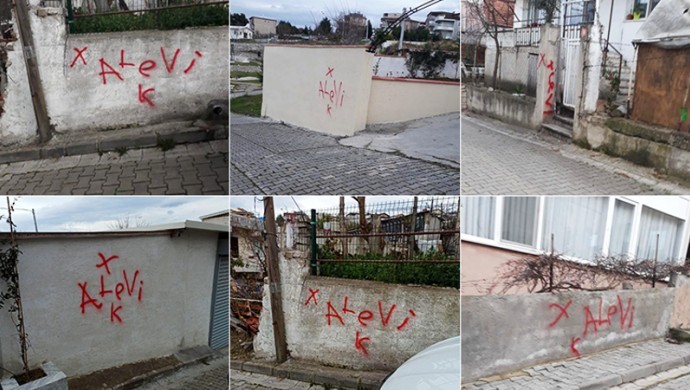Alevis and Christians were targeted in the vast majority of religion-based hate crimes recorded in Turkey in 2022, according to a report by the Freedom of Belief Initiative (İÖG), a human rights project carried out by the Norwegian Helsinki Committee, the Gazete Duvar news website reported on Tuesday.
The report, published on Monday and titled “Hate Crimes Motivated by Bias against Religion, Belief or Non-Belief in Turkey 2022″ listed data obtained from work monitoring religion, belief or non-belief-based hate crimes that were committed in Turkey last year.
According to the report, which collected and examined the data in compliance with standards for international rights, the ongoing hate crimes against religious or faith communities, their places of worship and other venues, their religious or spiritual leaders and members go unpunished most of the time.
The report aims to contribute to the prevention of hate crimes by addressing the impunity related to such incidents.
Taking note of the limited official data on hate crimes in Turkey, the report stated that 36 hate crimes, driven by prejudice based on religion, belief or non-belief, were identified in 2022. Out of these crimes, 15 targeted Alevis and 15 targeted Christians. These groups were followed by Jews (four incidents), Yazidis (one incident) and Muslims (one incident).
Among the incidents last year were an attack on an Alevi association building in Istanbul, the threatening of church officials in Malatya and three individuals leaving the church in Diyarbakır as well as the vandalism of a Jewish cemetery in Istanbul and the burning of a Yazidi’s house in Mardin.
Funda Tekin, the İÖG project assistant, communication officer and one of the authors of the report, explained to Gazete Duvar that the majority of individuals who were attacked didn’t report the incidents to any authorities due to reasons such as becoming accustomed to such actions and fearing exclusion or not being taken seriously.
“They might believe that if they report the incidents, they will face further victimization by both the police and other responsible parties,” Tekin said.
She also said following hate incidents, there is often no “effective and sensitive” process in place and that many of these cases remain unpunished or end up being dismissed.
“Additionally, both public authorities and the public do not openly take a firm stance against these crimes. All of these factors contribute to creating a conducive environment for similar incidents. When there is no consequence for these crimes, it becomes inevitable for new ones to occur,” Tekin added.
Tekin further stated that the harsh language and discriminatory hate speech in politics create fertile ground for hate crimes and emphasized the need for it to come to an end.
Alevis, who are estimated to account for 16.5 percent of Turkey’s population of 83 million, are the second-largest Islamic sect in Turkey, with Sunni Hanafi Islam the largest.
Some in the conservative and religious population in the country view Alevis as apostates; therefore, people adhering to the Alevi faith generally avoid revealing their beliefs in public out of fear of facing discrimination or social alienation.
Alevis follow a heterodox Islamic tradition that separates them from Sunni and Shiite Muslims. Some view it as a cultural identity as much as a religious faith.
Turkey has long denied Alevi demands for state recognition, and Alevi houses of worship, known as cemevis, are not officially recognized by the state, hence given no financial assistance.
Reports also show that dozens of Protestant pastors have had to leave Turkey along with their families in the past several years due to de facto entry bans and intelligence reports labeling them as “security risks.” This situation deals yet another blow to Turkey’s small Christian community.


